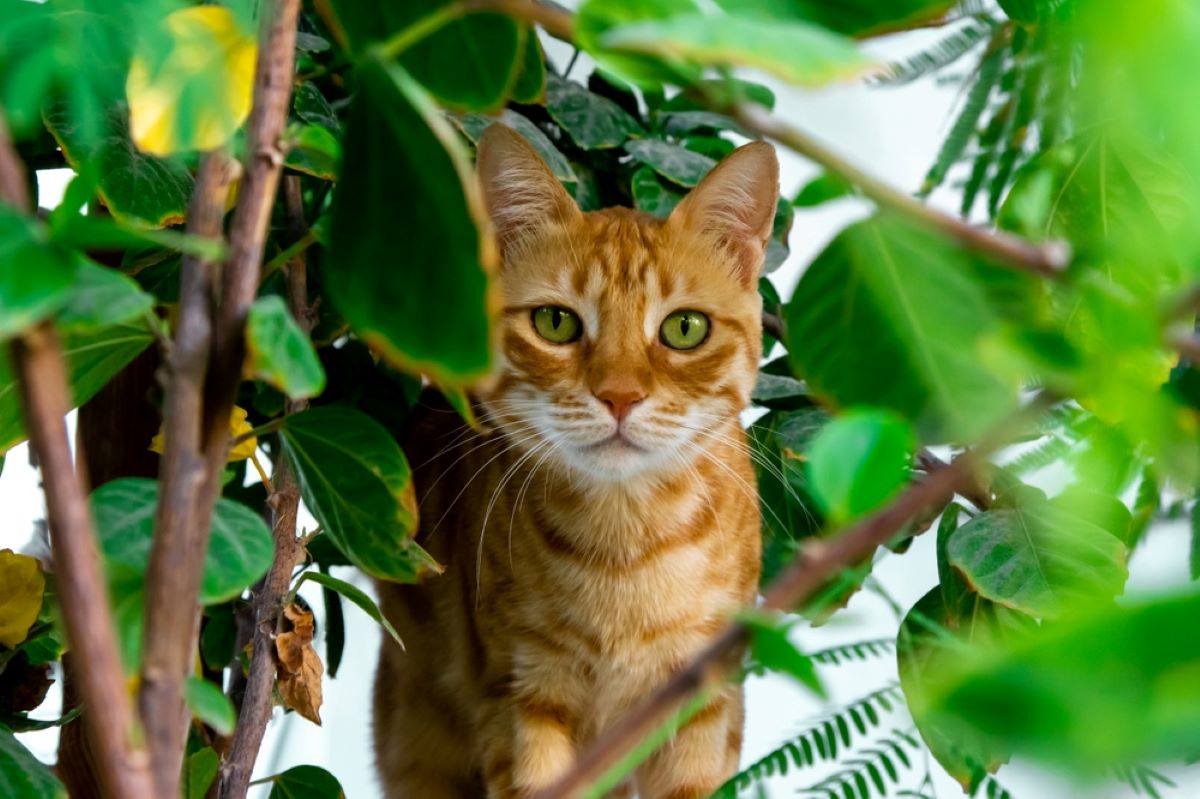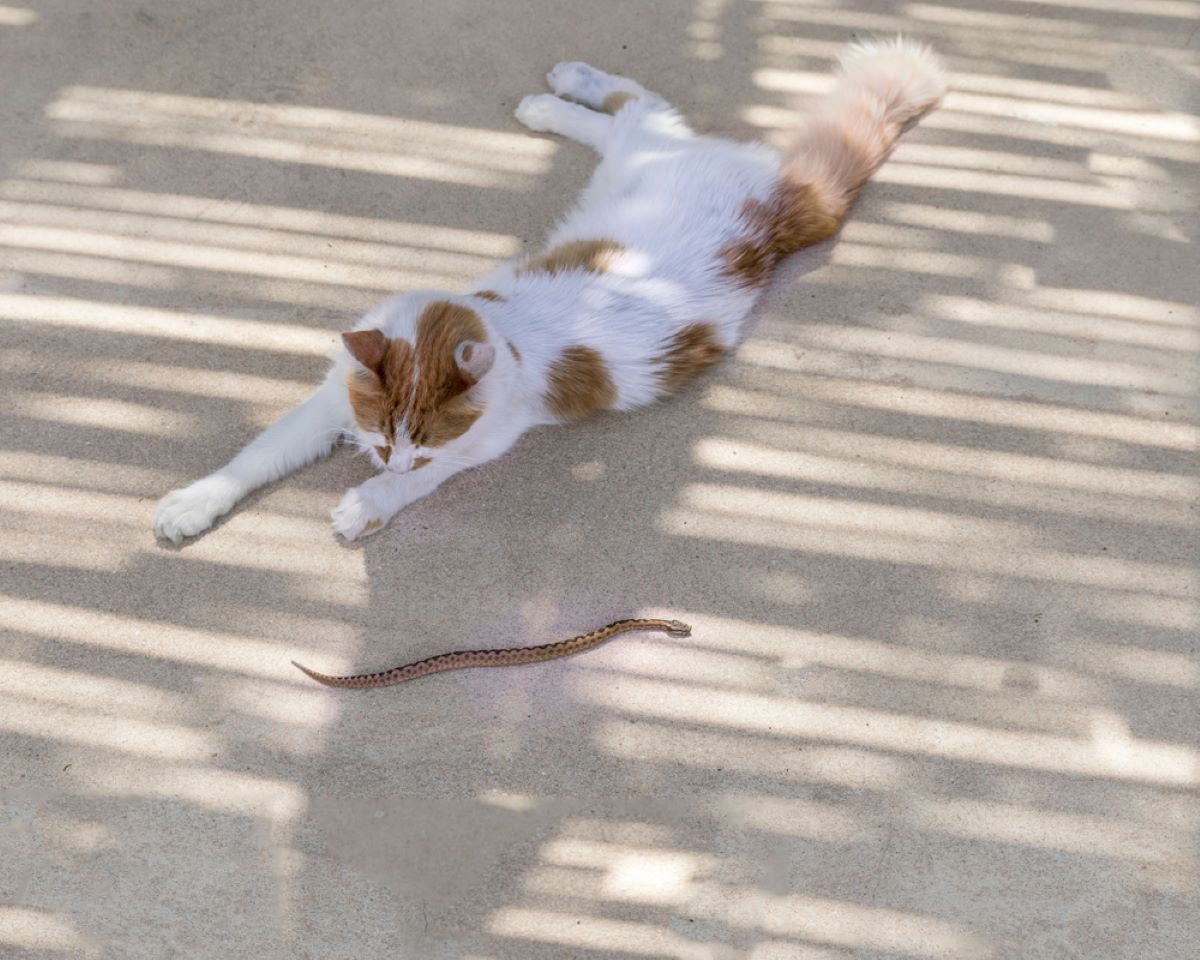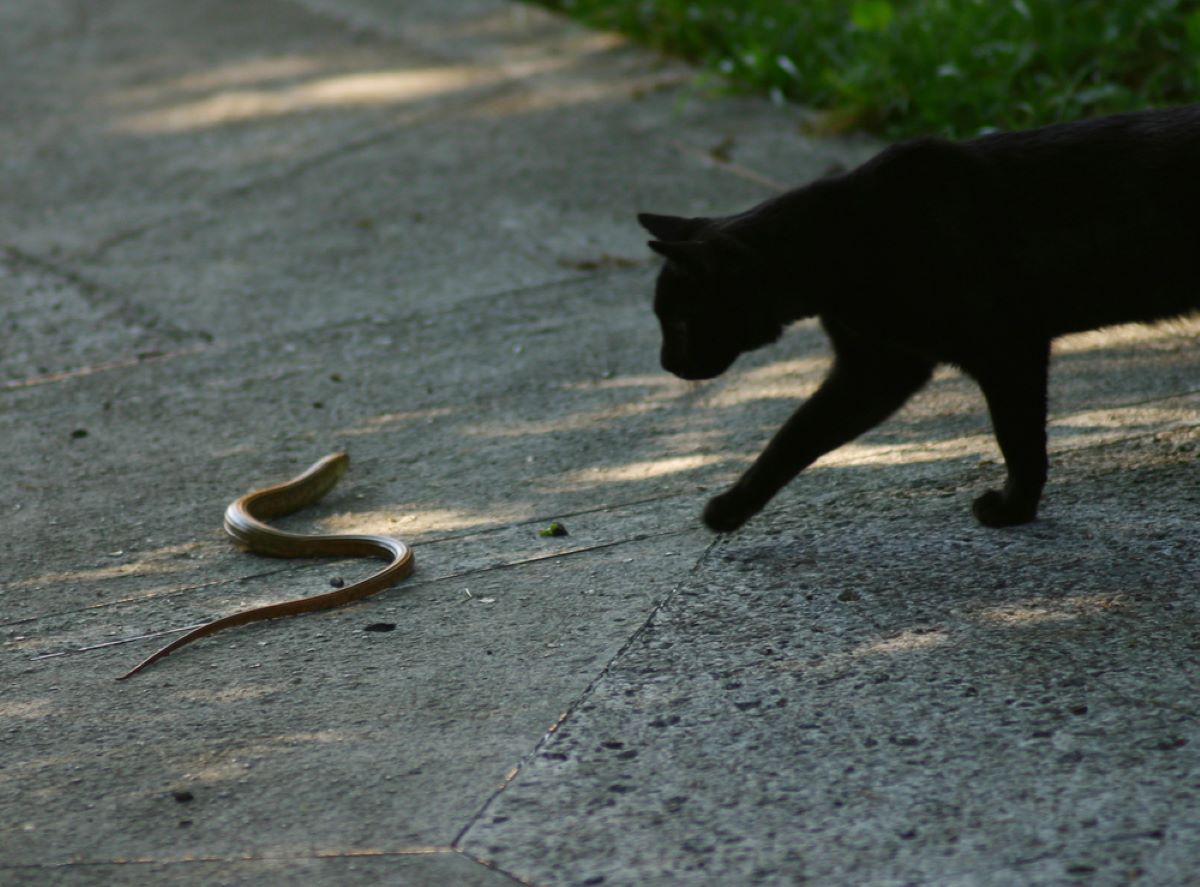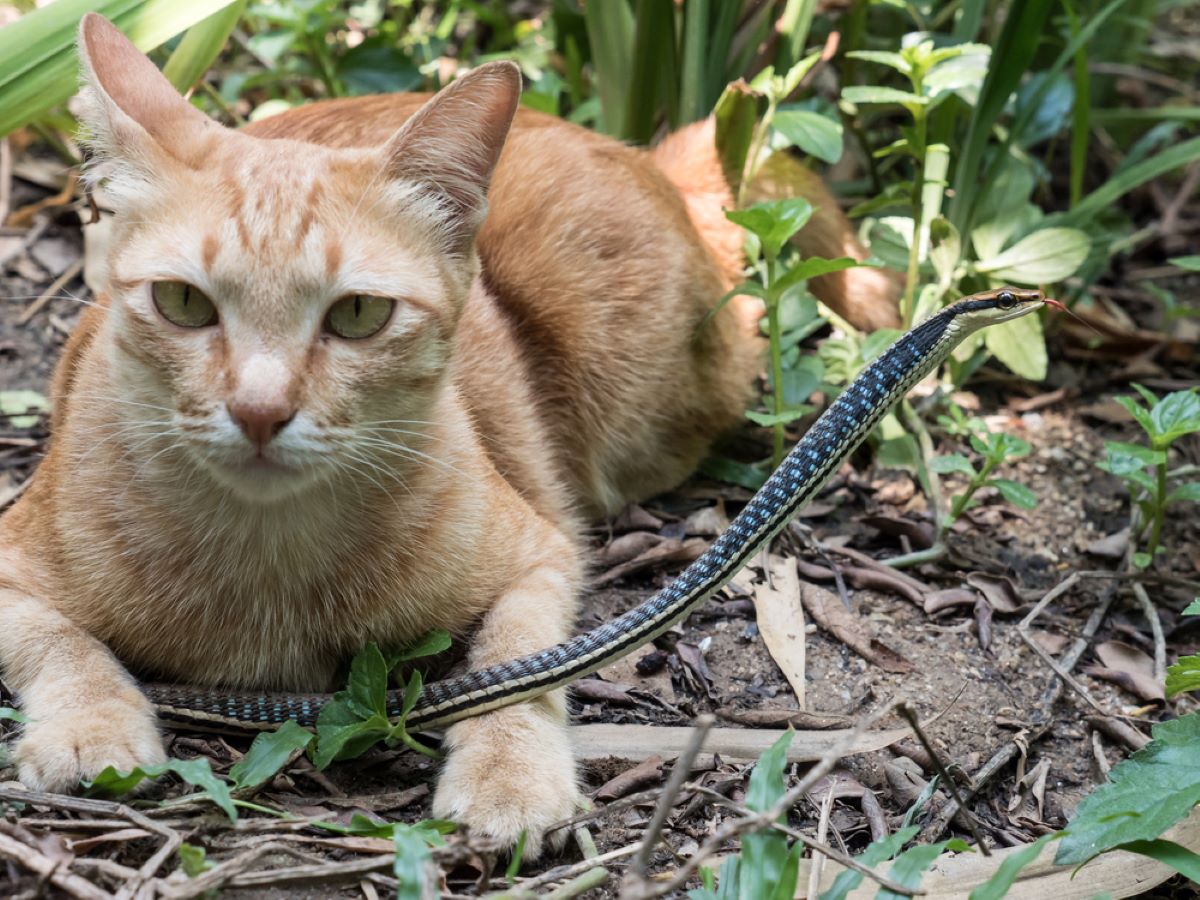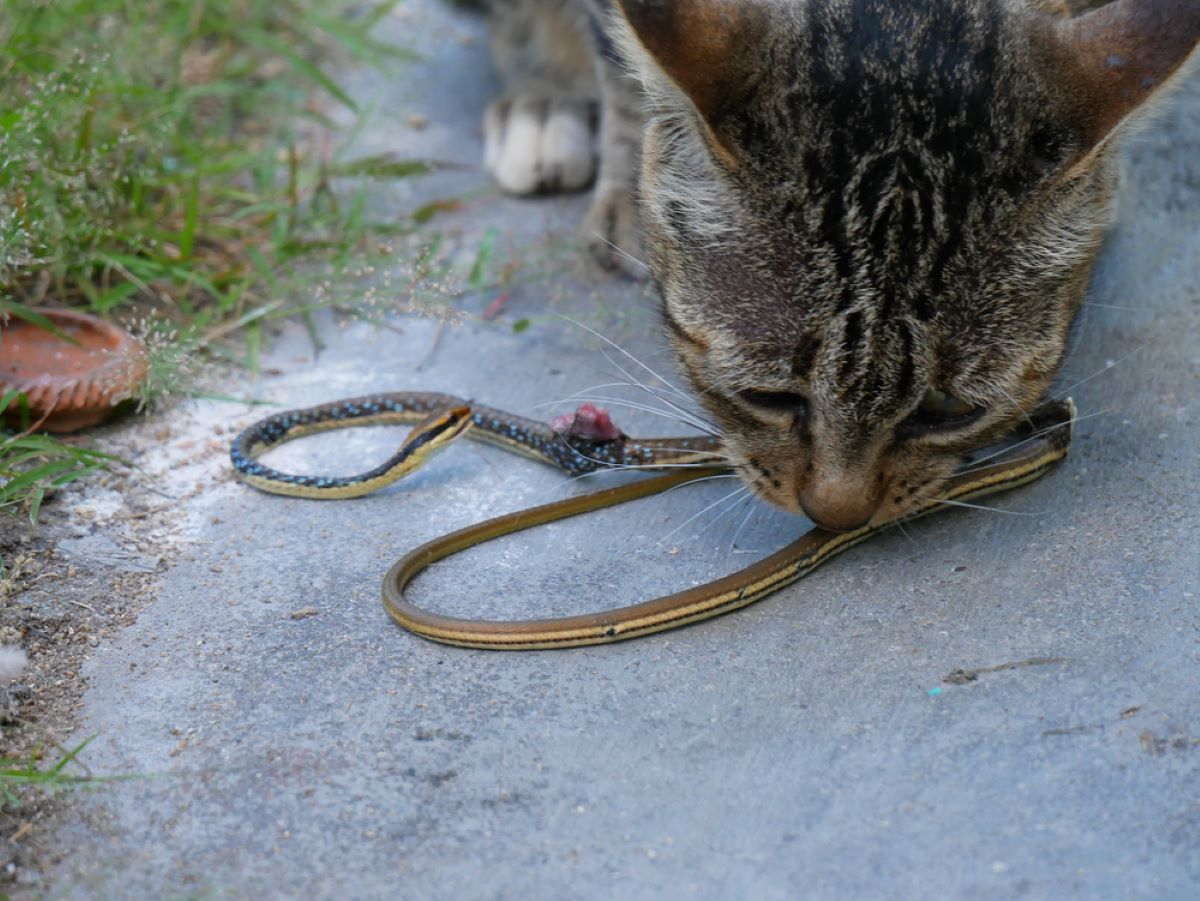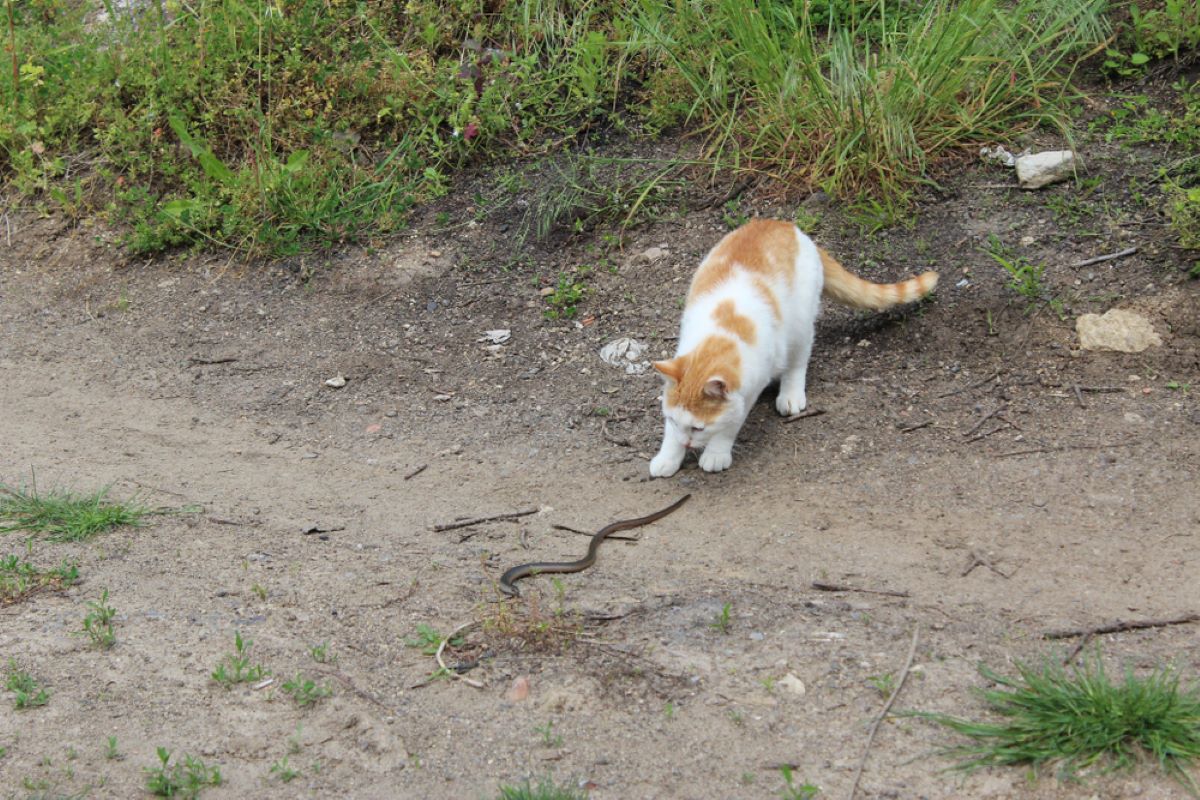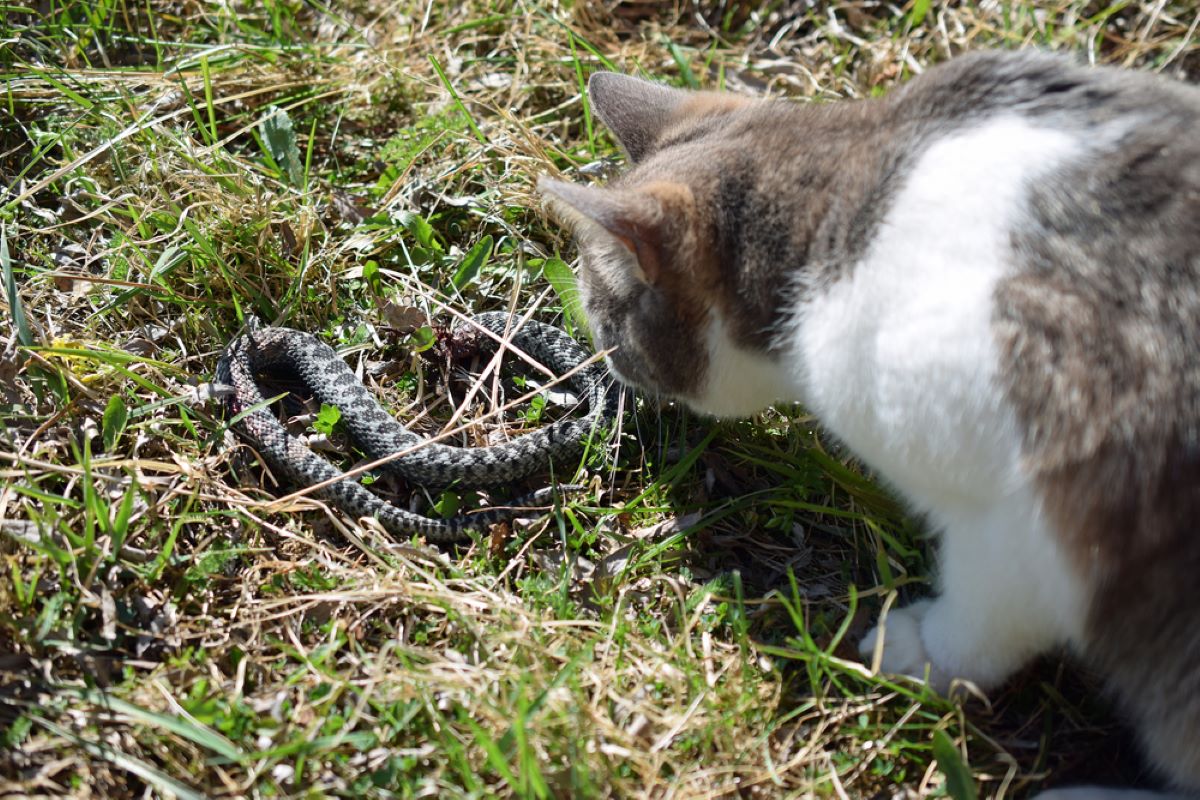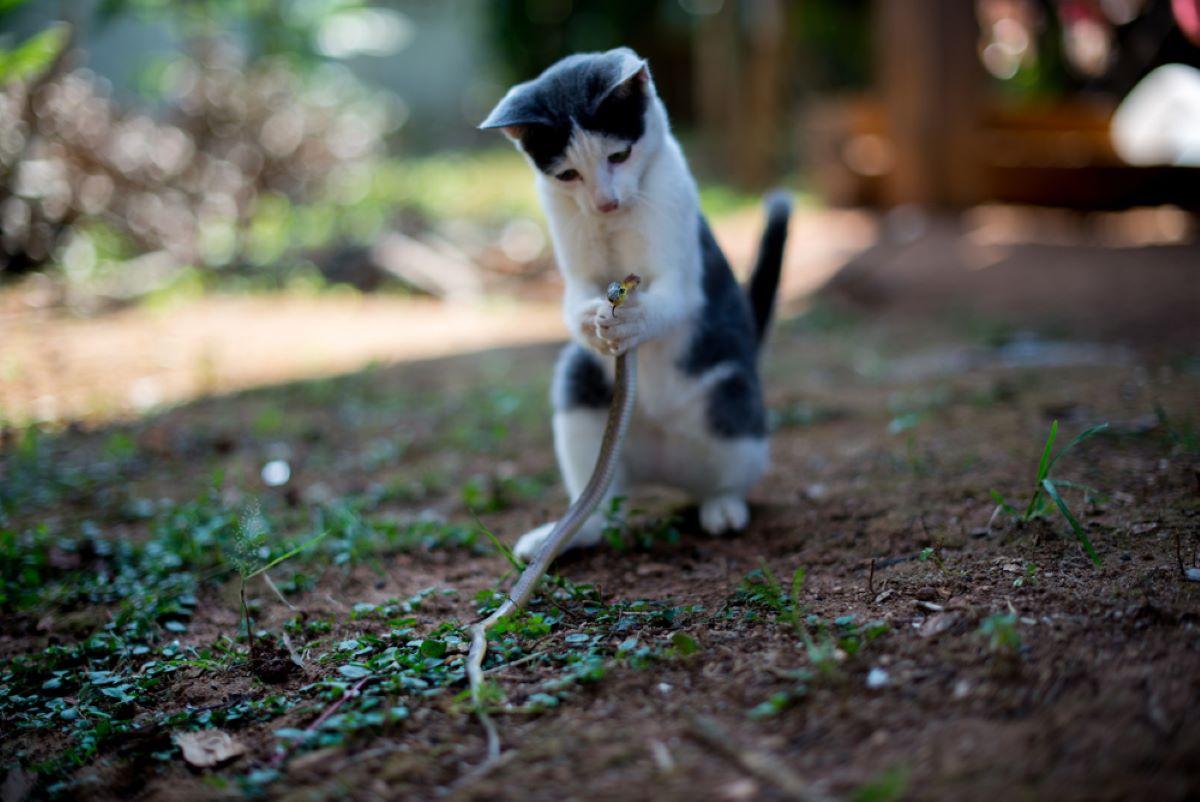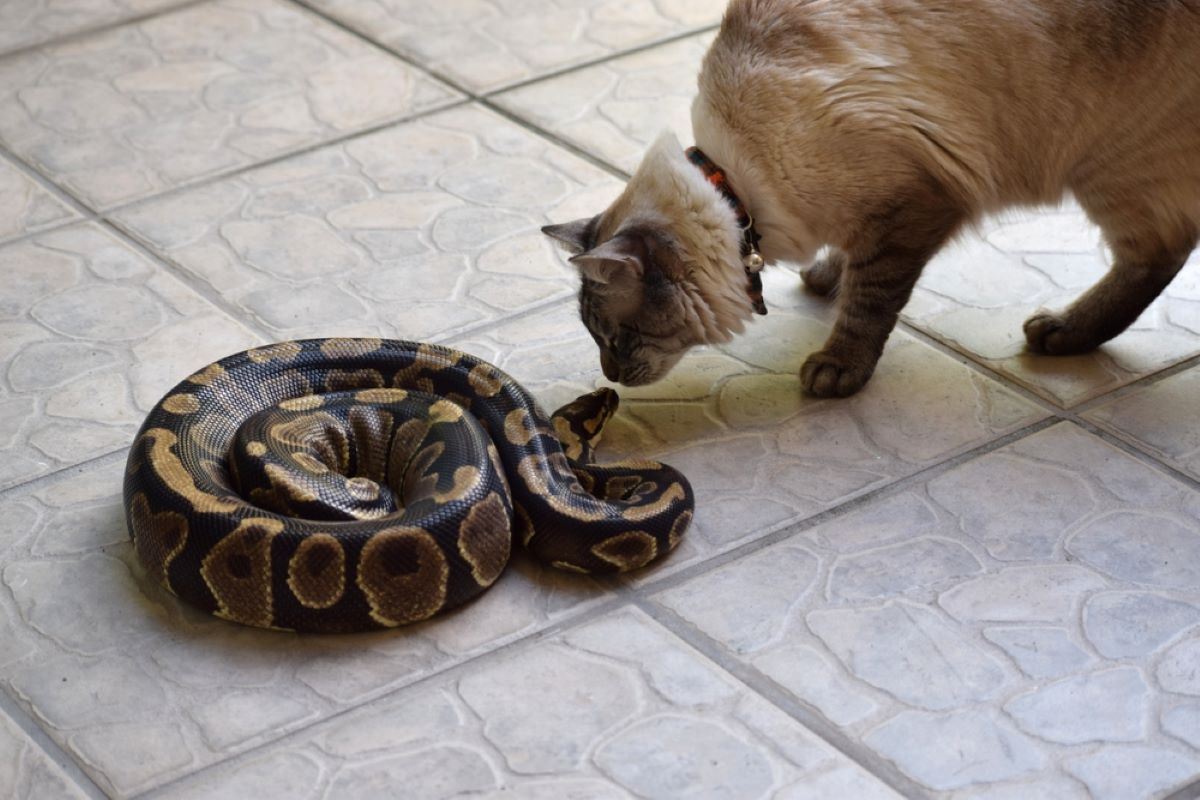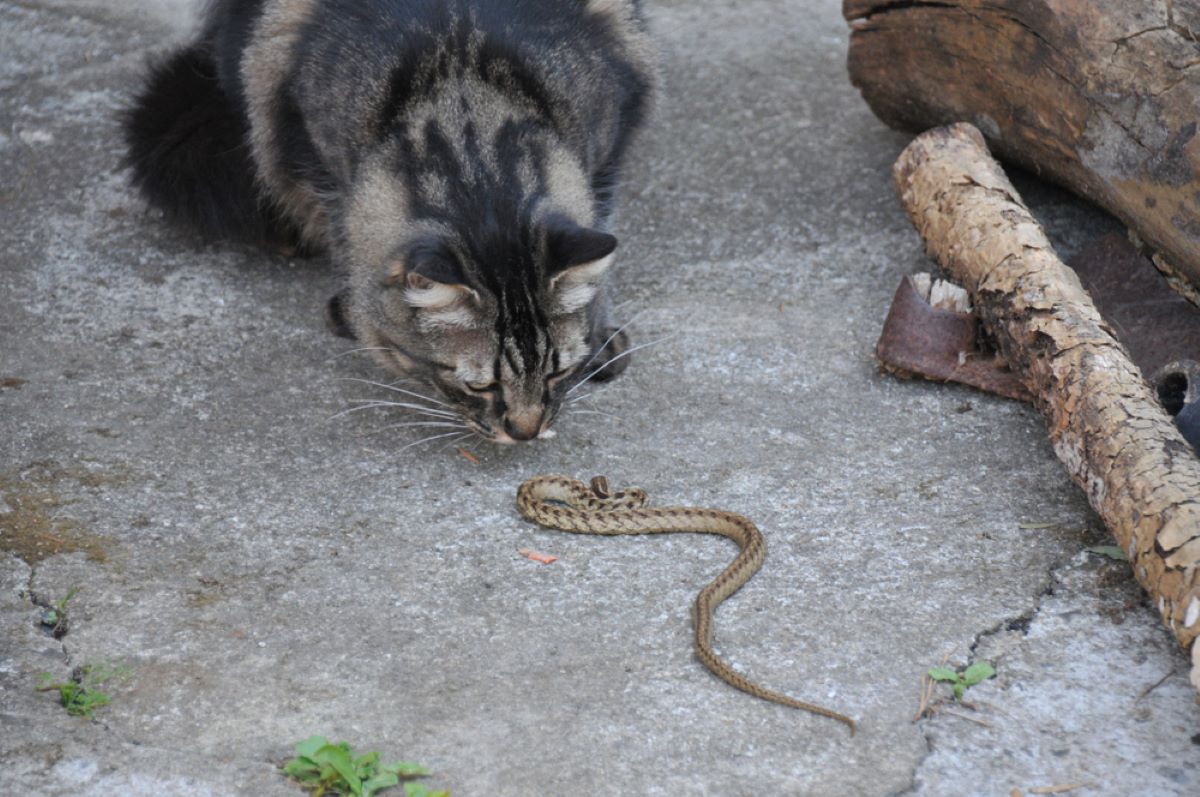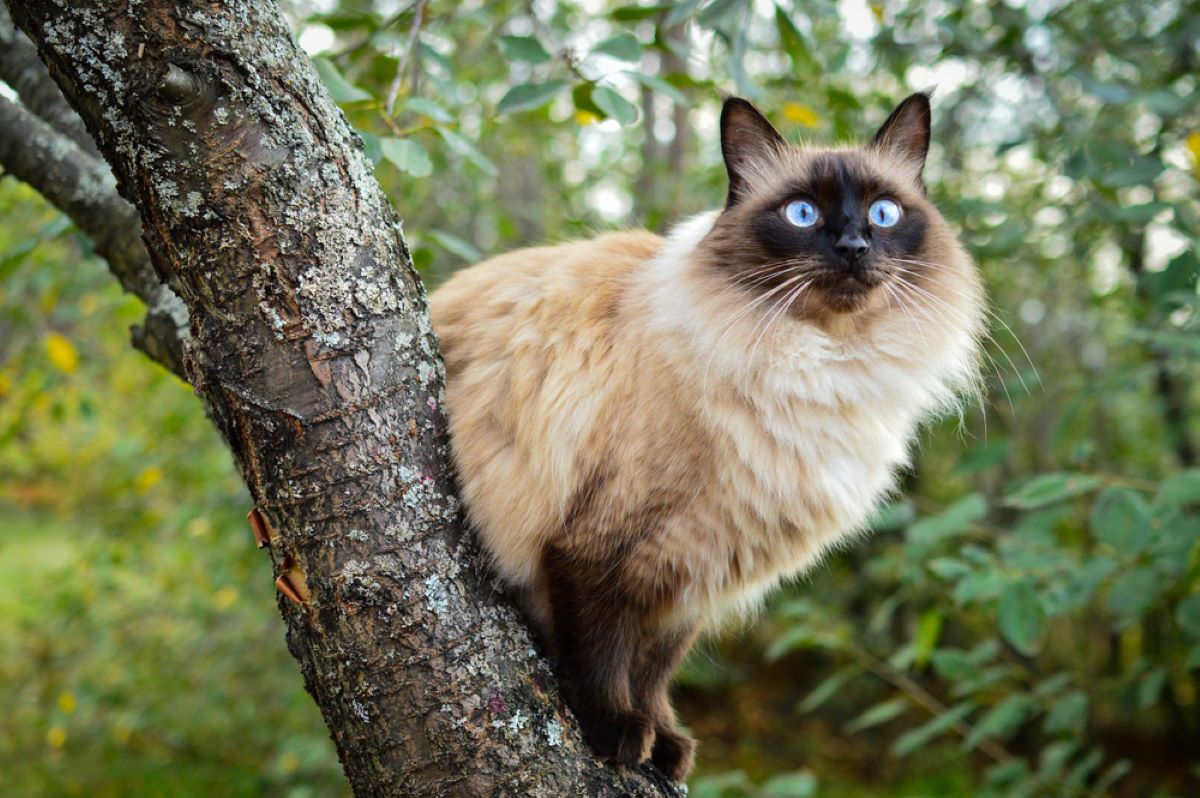📖 Table of Content:
- Where would my cat find a snake?
- Do cats eat snakes?
- Are snakes safe for a cat to eat?
- Can a fight between a cat and a snake be dangerous?
- Chances of survival
- Can cats be kept for “pest” control?
- So, should you hire a kitty?
- Can cats and snakes share an apartment?
- Can my snake eat my cat?
- How to make the right decision?
- The bottom line
We’ve all seen videos of cats going toe to toe with snakes. It’s impressive to see the animal that we know as cute and fuzzy gets the best of a serpent. But, it takes it to another level when you see your own kitty doing the same. But why do they fight? Do cats eat snakes? And would it be safe to have both as pets?
Eating would be a logical cause for a fight. They probably want to consume them like mice, but snakes are just a bit squirmier. Or do they just hunt for fun? Would they pounce at anything that moves or do they only go after certain animals?
If they do eat snakes, is it safe? Can they tell the difference between venomous and non-venomous snakes? How often do they get bitten back, if at all? Do cats even know how dangerous snakes can be? Would they fight if you had both as pets? Stick around to find all the answers you need!
Where would my cat find a snake?
If you own a housecat, the chances of her running into a snake are pretty slim. But, if your cat has access to the outdoors, they get significantly higher. Even in urban areas, the possibility of encountering a snake is never zero.
I once came across a snake in the very center of my city which is always packed with people. Luckily there were no cats around, so the only threat it had to face was the humans. Thankfully, I managed to get her to safety before she was harmed.
If I was able to find a snake in the city center, you definitely might see some in your garden. Cats are naturally curious, so even if that serpent isn’t looking for trouble, the cat will bring it to him. Owning a cat makes it more likely to find animal remains and snakes aren’t an exception.
And yes, a snake might find its way into your home but it’s very rare. It usually happens in warmer parts of the globe. So, if you don’t live in Australia or India, you shouldn’t worry too much. And if you are, let’s face it, you’re probably used to it by now.
Do cats eat snakes?
When we think of hunting, we first think of feeding and survival. The very reason hunting exists is so that predators can eat and gain crucial life energy. However, if we observe carnivores (in our case cats) we’ll notice something strange.
They don’t always hunt for food. How many times have you seen your feline playing with a bug or other small animals? She doesn’t always end up consuming them, right? It might seem cruel but there’s a good reason for this behavior.
Kittens are taught hunting through play. It’s a great way to develop all the necessary skills for the actual thing. It’s basically kitty school. It teaches them everything they’ll need in the future without the dangers of actually getting into it.
What you might not know though is that cats keep playing in their adult life as a way to practice. What might seem like toying with their food is just them keeping their skills sharp. So, they might hunt something down without eating it.
This is the most common case when it comes to snakes. Rarely will a feline eat one, but it won’t miss an opportunity to play around with it. You’ll probably find remnants of a snake all over your yard, but none in your cat’s belly.
Are snakes safe for a cat to eat?
What happens if your cat does eat a snake? Will she be okay? Should you take her to a vet? Well, that depends on what kind of snake she eats! It’s important to note that a feline wouldn’t eat one unless she was really hungry. I doubt you’re starving her, so you don’t need to worry.
Small, non-venomous snakes are perfectly fine for feline consumption. They might even provide a little bit of protein so they can be useful for strays. Some examples are corn snakes, rat snakes, and garter snakes. Problems arise with venomous and large snakes.
Big snakes are very difficult to digest and can cause stomach issues, but they aren’t too harmful. Venomous ones, on the other hand, can be troublesome. If your feline ate one, be sure to take her to the vet as soon as possible.
Can a fight between a cat and a snake be dangerous?
You can be sure that a snake won’t go down easy. It will fight with everything it’s got, and venomous snakes can be a real challenge. In most cases, a cat knows the limits of her power and won’t attack animals that she can’t handle. Felines can usually tell apart venomous from non-venomous snakes.
However, not all pet cats are blessed with such instincts. It can make you feel uneasy knowing that your furball might have gotten into a messy situation. Because of this, it’s always best to keep an eye on your kitty when she’s outdoors.
Not to mention that snakes aren’t the only danger lurking outside. You have to keep in mind that even the wildest of cats are still domesticated pets. Giving them unsupervised access to the outside is almost bound to lead to issues. Don’t get a pet if you won’t take care of it the way you should.
I’ve known owners who would let their feline wander around for days before coming home. Let’s say your cat got bitten and she still hasn’t returned. There would be no way for you to see any signs of her being unwell. And by the time she comes back, it would already be too late. Or worse, she wouldn’t return at all.
Chances of survival
If you do keep track of your cat, there are some signs she might show when bitten. If you notice these in time, her chances of survival rise by a significant amount. Cats tend to be more resistant to venomous bites, so it gives them more time.
Don’t get too relaxed or wait too long, though. If you notice any of the symptoms such as dilated pupils, shaking or shivering, lethargy, poor bladder control, or no appetite, take her to the vet right away.
There is always a possibility of the venomous bite being non-fatal. This is due precisely to a feline’s resistant nature. Some say they might even be twice as likely to survive such a bite than dogs or humans. The reason for this is the way cats react to injuries. While dogs become hyper, felines tend to calm down.
This calmness slows down venom from spreading throughout her body too quickly. It gives you more time to react and make sure they receive the antivenom. So, use this trait of theirs and rush them to get help immediately! Even if you’re not sure if the snake was venomous. Go to the vet!
Can cats be kept for “pest” control?
So you now know that cats sometimes eat snakes. And they definitely hunt them. But can this be exploited? Can you keep felines in your living area as a means to get rid of unwanted serpents?
Well, yes and no. It really depends on you. It would definitely be risky to let your cat “take care” of snakes, especially if they’re venomous.
On the other hand, cats might keep them away from your home even without fighting. Yes, they’ll definitely “clean up” all the non-venomous snakes in your surroundings. If they even get to encounter them, that is. Here are some reasons why snakes would avoid your fuzzball.
1. Fear
While cats basically don’t fear anything, snakes are terrified of felines. Not only is your furball bigger, but she’s also much quicker. She has sharp claws that are full of bacteria. Just a single scratch could be enough to cause a lethal infection. If the snake even manages to live to the end of the fight.
Just a single encounter with a feline would be enough to keep serpents away. Cats are fast, lean, agile, and pretty much ruthless. If they were bigger than me, I’d stay away as far as possible, too. Luckily, we’re the larger ones and we give them food and love, so we should be safe.
2. Urine
Another reason why snakes would stay off your property is feline urine. Anyone who has ever cleaned a litterbox can never forget the scent. Or just how bad it gets when it’s all over your carpet or sofa. It truly is one of the most unbearable smells.
But it can be very useful if your furball marks her territory around your house. The pungent smell is enough to ward off all sorts of critters. Ranging anywhere from rodents to even snakes. But aside from the nasty scent, urine can serve another purpose.
3. Competition
Feline urine not only smells horrific, but it can also serve as a warning. You’re aware that it lets other cats know whose territory they’re on. But did you know that it does that with other animals, too? Any animal that passes near it will instantly know that there’s a feline around.
And since both snakes and cats are predators, this leads to issues. The more carnivores around, the less food will be available. So, the moment the serpent comes onto feline territory, there’s competition. And since snakes are the weaker ones, they’ll usually leave to avoid trouble.
So, should you hire a kitty?
As we already stated, it all depends on you. But we would advise against it. You can never be sure if a venomous snake will cross her path. It’s too big of a risk to let your cat handle your snake problem. Especially if your furball isn’t used to fighting and facing threats.
You can always hope for some stray felines to be around. They tend to be much more skilled. They grew up facing all sorts of danger such as cars, dogs, unkind humans, large birds, and even snakes. You’ll rarely find serpents in areas with a lot of strays.
Can cats and snakes share an apartment?
You might have a feline and you’re thinking of getting a snake or it could be the other way around. Or you might not have either, but you want to get both. Either way, you’re wondering if these two could ever be friends. Or, at the very least, tolerate each other enough to share a home.
Unfortunately, since both are predators, it’s impossible for them to create a bond. Snakes don’t really form emotional connections with anyone, so don’t expect them to be friends. Thankfully, this doesn’t mean you can’t keep both in the same house. Here are some tips on how to do it.
1. Separate them
The safest way to keep both in the same household is to keep them in separate rooms. Cats are both hunters and extreme troublemakers. That means that even if you think your snake is safe in her enclosure, your furball will find a way in.
Keeping them in completely separate and preferably locked rooms is the best option. Some cats are so smart that they’ve learned to open doors. So, you can never be too careful. However, different rooms might not be an option in a small apartment.
Cats need a decent amount of space to move around and explore. If you live in a tiny apartment, limiting your cat to a room is only making it worse. In that case, having both as pets might not be the best idea. You need to be able to provide both an equally comfortable life.
2. See how they interact
Place both pets at a significant distance away from each other and observe how they act. If your cat seems overly interested or if your snake gets scared and defensive, separate them immediately. There’s no way for you to train them to be friendly toward one another.
However, if your feline looks uninterested, it might be fine to have them together sometimes. But they’ll still need to be heavily supervised. And it can only be for a short amount of time. It’s still highly risky though, so we’d advise against it.
Can my snake eat my cat?
This fear is even more common than worrying about your cat eating your snake. And the answer is no. Or well, in most cases. The only snakes capable of consuming felines are large ones such as pythons. But there are strict regulations when owning one, so you wouldn’t ever let them meet.
As for other types, they’re completely harmless to your furball. And you should be more worried about your cat hurting your little serpent. Most pet snakes are so small and harmless that it wouldn’t even take your feline a minute before tearing it apart.
Just seeing a cat is enough to make its poor little heart burst. They’re terrified and you would be too if you were stuck behind glass with a giant predator looming over you. So, to make sure their lives are not stressful, keep them separated at all times.
How to make the right decision?
Now that you have all the facts, it’s probably difficult to decide what to do. Should you get both? It all depends on why you’d want to have these pets in the first place. If you’re in love with both animals and are enthusiastic about owning them, go for it! But if you’re still unsure, there are a few things to keep in mind.
1. No friendship
The first is that if you wanted them to be buddies, you’re bound to be disappointed. Not only are they not friendly, but they’re also completely hostile toward each other. Both are competitive predators that are only bothered by each other.
They’re natural enemies, so don’t expect them to behave any differently indoors. Your snake will spend all its days living in fear. And your feline won’t rest until she sinks her claws and teeth into your serpent.
2. Trouble keeping them apart
To make it worse, they won’t ever stop trying to reach each other. Your cat will either try to get in the room or knock over the tank. And your snake will also be trying to escape, aware of the danger. So, keeping them both safe in their spaces is extremely stressful.
As amazing as it is to own either of these creatures, the anxiety of having both isn’t worth it. Would you truly be able to enjoy keeping them as pets if you can’t even leave the house relaxed? Constantly thinking about your cat breaking in to visit your snake would make every day unbearable.
3. Double the trouble
It’s no secret that pets tend to be very expensive. Just buying one can cost you a lot. And the headaches only start when you take into account all the vet visits, food, toys, and such. So, it’s only natural that the more animals you keep, the more money you’ll need to spend.
And one of those animals being a snake doesn’t make it any cheaper. You’ll spend a lot on enclosures, heat sources, special food, and maybe worst of all – vet visits. Taking a snake for a checkup isn’t quite as easy as taking a dog or a cat. You’ll most likely need to find a specialist and they’re very expensive.
So, keeping both at the same time can drain both your wallet and your energy. A lot of people only make a budget for buying a pet. They completely forget about all of the other expenses. And the fact that they need to be dealt with every month for several years.
However, if you’re ready to put in the time, effort, money, and energy, then owning both can be a blast! Both animals have their own unique personalities and getting to know them will be amazing. Only you know your limits and capabilities.
4. Other animals
You might have noticed that there are some cases where cats befriended reptiles. The most prominent example is the Bearded Dragon. So, how come they can be pals with them and not snakes? Well, it still boils down to competition.
Cats will view Bearded Dragons as either prey or friends. It depends on the individual feline. Some might be more prone to hunting, while others might be uninterested. But either way, you have bigger chances of your furball accepting a Bearded Dragon.
So, if that seems like it could be fun too, definitely consider it. Do some research on this reptile and see if he might be a better fit for you. That way you’ll get your wish fulfilled. You’ll own a cat and a really cool reptile.
Or if you just want multiple pets, look into other animals, too! Dogs can be a great start. They’re known to easily make friends with just about anything. The key is to start when they’re young. So, if you get a puppy, chances are he and your feline will fall in love.
The bottom line
It’s a shame that these two beautiful creatures can’t be companions. In a sense, they have a lot in common. They’re both predators, they love to eat mice and they capture human hearts. But this alikeness makes them view each other as nothing but competition.
To felines, snakes are just a chewy meal or toy, and to snakes, cats are just a threat. Unless it’s a venomous snake. Then the match could go in either’s favor. It usually depends on whether the kitty has a human backing her up, ready to get her medical help.
Whether they be pets or animals in the wild, cats and snakes just don’t mix. It’s in your best interest to keep them away from each other if they’re pets, for your snake’s sake. And if you just own a feline, for her own sake.
We hope you find this article helpful and that you can now decide on which pet to get. Or that you’re now sure not to let your kitty wander around your house on her own. It’s a sad truth, but the ferocious and unpredictable feline and the cold-blooded serpent don’t go well together.
